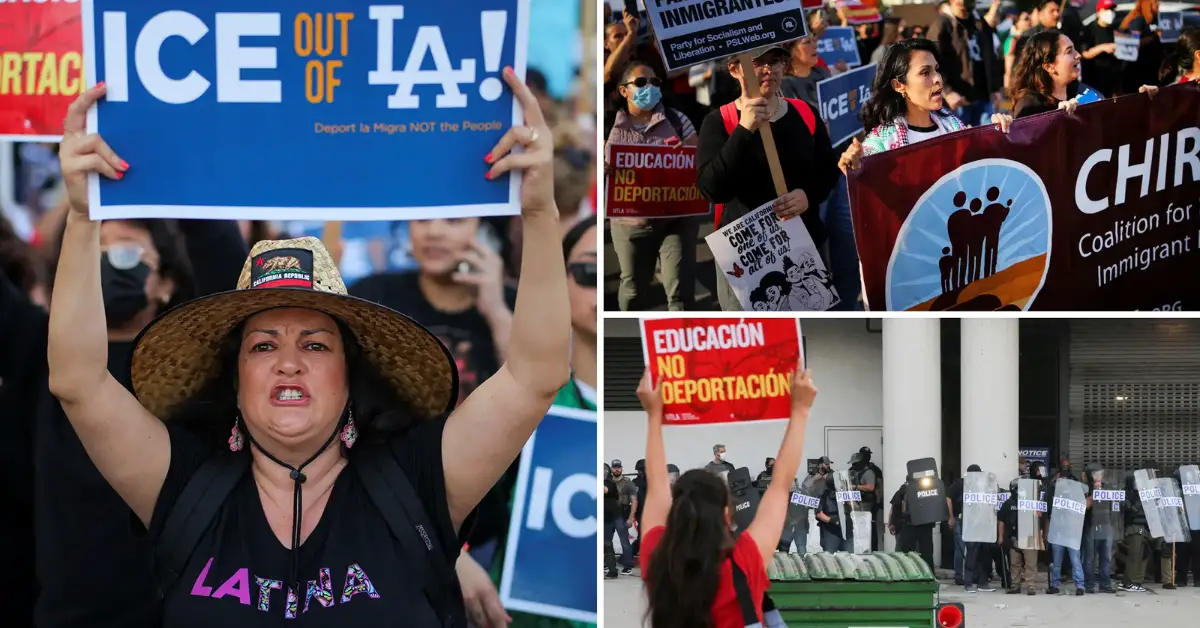The ongoing protests by migrant groups in Los Angeles have drawn attention to some concerning ties to political organizations and foreign influence. Recent reports have revealed that some of these protests are being funded by organizations with strong Democratic Party connections. In addition, some groups involved have been linked to Chinese Communist Party (CCP) influences, raising questions about the origins and objectives of these movements.
Los Angeles has long been a hub for activism, with various social movements taking root over the years. However, the recent protests have taken on a new dimension, with allegations that taxpayer money is being used to support causes that some believe align with political agendas. These groups, often advocating for migrant rights, have used the protests to call attention to issues such as immigration policies, the treatment of undocumented workers, and the overall social climate in the United States.
Critics argue that the involvement of groups with ties to political entities, especially the Democratic Party, complicates the narrative surrounding the protests. While the protests have certainly highlighted legitimate concerns about migrant rights, many are questioning whether they are being used as political tools to further the Democratic Party’s influence. The funding of these movements with taxpayer money has raised concerns among some citizens who believe that their taxes should not be used to fund political activities, especially ones that seem to have an ideological or partisan agenda.
What makes the situation even more complex is the alleged involvement of organizations with connections to the Chinese Communist Party. Experts have pointed out that some of the groups supporting the protests have previously received funding from foreign entities, including organizations with ties to the CCP. This has led to speculation about the motivations behind some of the protests and whether they are being used to further China’s political influence in the U.S.
While the link to the CCP may seem far-fetched to some, the presence of foreign-backed organizations in the U.S. political landscape is nothing new. Over the years, there have been increasing concerns about the extent to which foreign entities, especially China, are attempting to influence U.S. politics.
This can include everything from financial donations to local political campaigns to more subtle forms of support for activist movements. In this case, the protests in Los Angeles seem to be another example of how foreign interests could be shaping domestic debates.

The allegations have sparked a heated debate, with some defending the protests as a legitimate expression of migrant rights and others arguing that they are part of a larger, coordinated effort to influence U.S. politics through manipulation and foreign interference. Many are calling for more transparency in the funding of activist organizations to better understand who is behind the protests and what their true motivations are. There is also a growing demand for oversight into how taxpayer money is being used to support these movements.
Despite the controversy, the protests themselves have been impactful, drawing attention to the ongoing struggles faced by migrants in the U.S. Many have used the demonstrations to voice their frustrations about the lack of comprehensive immigration reform and the challenges that undocumented workers face in finding work and receiving basic services. There is no doubt that the issues being raised are significant and deserve attention.
At the same time, the growing involvement of political and foreign organizations in these protests adds a layer of complexity to the situation. It’s no longer just a question of whether migrant rights should be prioritized, but whether these protests are being co-opted for political gain, both domestically and internationally.
In the end, the protests in Los Angeles are part of a larger conversation about immigration, politics, and foreign influence in U.S. affairs. As the situation continues to evolve, it will be important to closely examine the motivations behind the protests, the funding sources, and the broader political context in which they are taking place. This will help to ensure that the issues at the heart of the protests—immigrant rights—are not overshadowed by external political and foreign interests.



